07/07/21
K-State Current - July 7, 2021
K-State Current is a weekly news update for the Kansas Board of Regents to apprise the Regents on a few of the many successes and achievements made by K-State faculty, staff and students.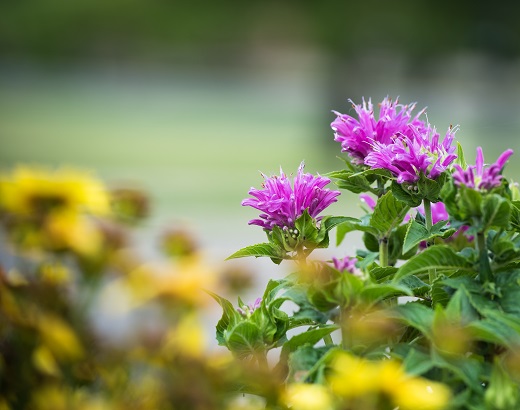
K-State News
K-State reaches 72% COVID-19 vaccination rate
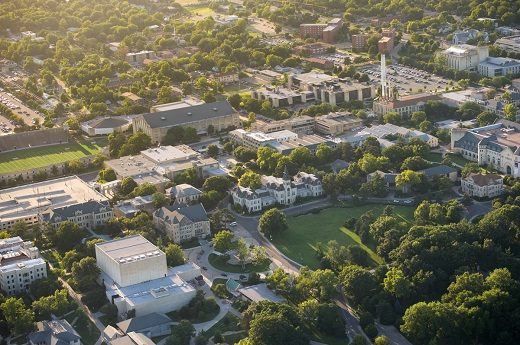 Kansas State University has surpassed an important vaccination milestone in the fight against the COVID-19 pandemic.
Kansas State University has surpassed an important vaccination milestone in the fight against the COVID-19 pandemic.
Lafene Health Center officials estimate that more than 72% of K-State students, faculty and staff have received at least one COVID-19 vaccine dose.
The K-State vaccination rate exceeds the 70% goal of the nationwide COVID-19 College Vaccine Challenge. K-State has joined more than 700 other colleges and universities that are participating in the COVID-19 College Vaccine Challenge, which is an initiative from the White House and the U.S. Department of Education to challenge universities to have at least 70% of students, faculty and staff vaccinated by the beginning of the fall 2021 semester.
"We're thrilled with our K-State vaccination numbers because they are a step in the right direction toward ending the COVID-19 pandemic," said Kyle Goerl, medical director of Lafene Health Center. "But now is not the time to let down our guard. We must continue to be cautious, to practice health and safety measures, and to look out for our fellow K-Staters."
More than 16,100 K-State students, faculty and staff — out of a total K-State population of about 22,300 people — have received the COVID-19 vaccine. Vaccination status is protected health information and the university estimates are based on vaccine-specific information provided by the Kansas Department of Health and Environment tracking system.
"I would not be surprised if our vaccination rate is slightly higher than 72% because there may be some students, faculty and staff who were not included in the state tracking system," said Thomas Lane, vice president for student life and dean of students. "We continue to strongly encourage all K-State students, faculty and staff — especially our new students and employees — to get their COVID-19 vaccine if they have not done so. We want every Wildcat to be a Wellcat as we look forward to the fall semester."
Upload your vaccination card
The university continues to strongly encourage all students, faculty and staff who can receive the COVID-19 vaccination to do so before arriving on a K-State campus. K-State students, faculty and staff are encouraged to voluntarily upload their COVID-19 vaccine cards to the myLafene+ patient portal.
Additional vaccine information
Individuals who are not vaccinated are strongly encouraged to continue wearing face coverings.
K-State students, faculty and staff can continue to receive COVID-19 vaccines through Lafene Health Center. For a limited time, Lafene is offering single-dose Johnson & Johnson vaccines. When that supply is exhausted, Lafene plans to offer a two-dose vaccine. Appointments are required and can be made on the myLafene+ patient portal or by calling 785-532-6544.
HealthQuest credits are also available for employees who report COVID-19 immunizations.
Find more COVID-19 vaccine information from the Kansas Department of Health and Environment. Your primary care provider also can provide additional information about the COVID-19 vaccine.
The Centers for Disease Control and Prevention also offers an online tool to find a COVID-19 vaccine near you.
More information about the COVID-19 vaccine and a list of frequently asked questions can be found on the K-State COVID-19 vaccine information website.
K-State virologists publish new findings on SARS-CoV-2 treatment option
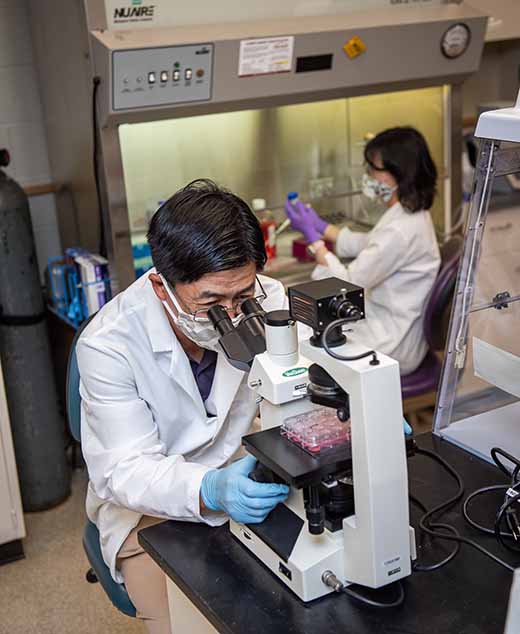 Kansas State University researchers Kyeong-Ok "KC" Chang, left, and Yunjeong Kim have published a new study about a successful postinfection for SARS-CoV-2, the virus that causes COVID-19.
Kansas State University researchers Kyeong-Ok "KC" Chang, left, and Yunjeong Kim have published a new study about a successful postinfection for SARS-CoV-2, the virus that causes COVID-19.
A recent study by Kansas State University virologists demonstrates successful postinfection treatment for SARS-CoV-2, the virus that causes COVID-19.
College of Veterinary Medicine researchers Yunjeong Kim and Kyeong-Ok "KC" Chang published the study in the prestigious journal Proceedings of the National Academy of Sciences of the United States of America, or PNAS. They found that animal models infected with SARS-CoV-2 and treated with a deuterated protease inhibitor had significantly increased survival and decreased lung viral load.
The results suggest that postinfection treatment with inhibitors of proteases that are essential for viral replication may be an effective treatment against SARS-CoV-2. These protease inhibitors are a class of antiviral drugs that prevent viral replication by selectively binding to viral proteases and blocking the activation of proteins that are necessary for the production of infectious viral particles.
"We developed the protease inhibitor GC376 for treating a fatal coronavirus infection in cats, which is now under commercial development as an investigational new animal drug," said Kim, associate professor of diagnostic medicine and pathobiology. "After COVID-19 emerged, many research groups reported that this inhibitor is also effective against the coronavirus that causes COVID-19, and many are currently pursuing the development of protease inhibitors as a treatment."
Kim and Chang modified GC376 using a tool called deuteration to test its efficacy against SARS-CoV-2.
"Treating SARS-CoV-2-infected mice with deuterated GC376 significantly improved survival, viral replication in lungs and weight losses, which shows the efficacy of the antiviral compound," said Chang, professor of diagnostic medicine and pathobiology. "The results suggest deuterated GC376 has a potential for further development, and this deuteration method can be utilized to other antiviral compounds to generate potent inhibitors."
The virologists are continuing to develop improved inhibitors using various methods. Deuterated GC376 is currently being evaluated for further potential development.
Previous work done by Kim and Chang is continuing development through licensing agreements with industry partners.
K-State Faculty Highlights
Engineering professor's graphene additive manufacturing research makes journal's cover story
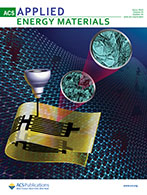 Research led by Kansas State University's Suprem Das, assistant professor of industrial and manufacturing systems engineering, in collaboration with Christopher Sorensen, university distinguished professor of physics, shows potential ways to manufacture graphene-based nano-inks for additive manufacturing of supercapacitors in the form of flexible and printable electronics.
Research led by Kansas State University's Suprem Das, assistant professor of industrial and manufacturing systems engineering, in collaboration with Christopher Sorensen, university distinguished professor of physics, shows potential ways to manufacture graphene-based nano-inks for additive manufacturing of supercapacitors in the form of flexible and printable electronics.
As researchers around the world study the potential replacement of batteries by supercapacitors, an energy device that can charge and discharge very fast — within few tens of seconds — the team led by Das has an alternate prediction. The team's work could be adapted to integrate them to overcome the slow-charging processes of batteries. Furthermore, Das has been developing additive manufacturing of small supercapacitors — called micro-supercapacitors — so that one day they could be used for wafer-scale integration in silicon processing.
"Additive manufacturing is fascinating, cost-effective and has versatile design considerations,” Das said.
The team has developed supercapacitors that have been tested for 10,000 cycles of charging and discharging cycles, a number that is promising to evaluate the reliability of these devices, Das said The team is also studying the versatility of these micro-supercapacitors by printing on mechanically flexible surfaces. For this, they used 20-micrometer-hin polyimide — plastic — substrates with high reliability. Das is highly interested in translating emerging materials to devices.
"When you think about best materials and wish to make the best devices, it is not simple and straightforward," Das said. "One needs to then understand the underpinning physics and chemistry involved in devices."
Another advantage of Das' invention is the green aspects of the research that he visualized through constructive discussions with Sorensen. When Das met Sorensen, he realized he could use his expertise in additive manufacturing to transform these materials into useful things; in this case, making tiny energy storage devices.
A few months later, Das filed for a U.S. patent after developing a nano-ink technology and used it to demonstrate printed micro-supercapacitors.
Das is particularly interested in forming this synergistic collaboration with Sorensen because of the energy-efficient, highly scalable and chemical-free nature of the graphene production process and his own group's graphene ink manufacturing process. Both of these processes are patented/patent-pending technologies and are industrially relevant, Das said.
"We make high-quality, multilayer graphene by detonating fuel-rich mixtures of unsaturated hydrocarbons such as acetylene with oxygen in a multi-liter chamber," Sorensen said. "Our patented method is simple requires very little energy, hence is ecologically benign; requires no toxic chemicals; and has been scaled up to yield high-quality, inexpensive graphene."
Graphene has been recognized as a wonder material with much potential because of its many superlative physical properties Many graphene manufacturing methods have been developed across the globe and graphene has been produced in ton quantities. Technologists, however, are well aware that graphene is not yet in the marketplace because none of these methods have had the right combination of economy, ecology and product quality to allow graphene to fulfill its potential. But both the methods of producing graphene and nano-inks pursued at Kansas State University are on target to address all of these requirements, according to Sorensen and Das.
The printed supercapacitor research, Graphene Aerosol Gel Ink for Printing Micro-Supercapacitors, was recently published as the cover article in the journal ACS Applied Energy Materials.
Former postdoctoral researcher Anand Gaur from the Das research team, several graduate students in Das and Sorensen's groups, and associate professor Brice LaCroix in the K-State geology department have contributed to this work. The work was supported by a grant from the National Science Foundation.
BRI director ranks in Top 100 Scientific Reports papers
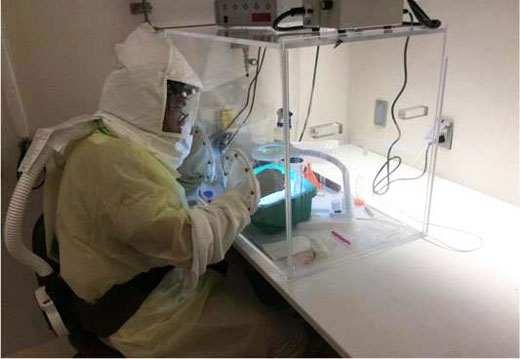 A study at the Kansas State University Biosecurity Research Institute is the first to confirm that SARS-CoV-2 cannot be transmitted to people by mosquitoes. The study is one of the Top 100 articles published by Nature Scientific Reports.
A study at the Kansas State University Biosecurity Research Institute is the first to confirm that SARS-CoV-2 cannot be transmitted to people by mosquitoes. The study is one of the Top 100 articles published by Nature Scientific Reports.
A paper co-authored by Stephen Higgs, associate vice president for research and director of the Biosecurity Research Institute, or BRI, and published in Nature Scientific Reports has placed in the Top 100 downloaded research papers in 2020.
The article, titled "SARS-CoV-2 failure to infect or replicate in mosquitoes: an extreme challenge," received 20,379 article downloads in 2020. Nature Scientific Reports published more than 21,000 papers in 2020.
Higgs' research, covered in the paper, demonstrates that even under extreme conditions, the SARS-CoV-2 virus is unable to replicate in mosquitoes and therefore cannot be spread to humans even in the unlikely event that a mosquito fed upon an infected host.
"We thought that our publication, which was the first to show that SARS-CoV-2 did not infect mosquitoes, would get a lot of attention, but being in the Top 100 of more than 21,000 Nature Scientific Reports papers published last year is just amazing," Higgs said.
A news release from the university received similar attention.
"The K-State news release about this publication has appeared in more than 600 news outlets in 42 countries and has been translated into 18 different languages," said Beth Montelone, interim vice president for research. "If this were a paid advertisement, we estimate that it would have cost $18.7 million! Great publicity for research done at K-State's BRI."
The full list of Nature Scientific Reports 100 most downloaded articles can be found online.
Check out the K-State Global Food Systems "Something to Chew On" podcast to learn more about Higgs and his research.
K-State Student News
Doctoral candidate in biology receives Sarachek Predoctoral Honors Fellowship
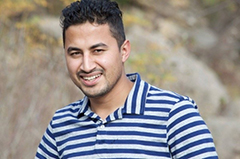 Anil Pant, doctoral candidate in biology, Nepal,was awarded the $17,600 Alvin and RosaLee Sarachek Predoctoral Honors Fellowship in Molecular Biology.
Anil Pant, doctoral candidate in biology, Nepal,was awarded the $17,600 Alvin and RosaLee Sarachek Predoctoral Honors Fellowship in Molecular Biology.
Alvin and RosaLee Sarachek, Wichita, established the fellowship to recognize a doctoral student at Kansas State University who has demonstrated exceptional research and scholastic accomplishments. An interdisciplinary faculty selection committee determines the fellowship and award recipients. The awards program is offered through the university's Graduate School.
The primary focus of Pant's research is to understand how vaccinia virus infection repurposes the nutrient resources of host cells to support optimal viral replication. Vaccinia virus was used as a live vaccine to eradicate smallpox and is still used as a model to study infections caused by other members of the poxvirus family that cause significant morbidity and mortality in humans and economically important animals. Vaccinia virus is also used as an agent for cancer therapy and the development of vaccines against diseases such as HIV/AIDS, Ebola, influenza, MERS/SARS-coronavirus.
Pant's research has identified metabolic weaknesses in the poxvirus lifecycle that could be targeted to develop efficient anti-poxviral therapies. His work has also identified key virus and host factors that interact at the interface of metabolism, which could lead to the development of novel strategies for the advancement of poxvirus-based tools for vaccine development and cancer treatment. Zhilong Yang, associate professor of biology, is Pant's major professor.
Pant received his bachelor's and master's degrees in medical microbiology from Tribhuvan University in Kathmandu, Nepal. Upon completion of his doctoral degree, he will use the Sarachek fellowship to support the next stage of his career as a postdoctoral researcher. He intends to continue his research in the field of metabolism to get a better understanding of the mechanism of cancer causation and broaden his understanding of why tumor cells have a greater dependence on specific enzymes and/or nutrients than normal cells. Pant hopes that his contribution to science will someday provide avenues to develop effective anti-cancer therapies.
The fellowship is made possible through generous annual expendable gifts to the KSU Foundation by the late Alvin Sarachek and his wife RosaLee. Alvin Sarachek received his doctorate in genetics from Kansas State University in 1957. The Saracheks valued the university's tradition of offering a broad array of quality programs in the life sciences, many with outstanding national reputations. They created the fellowship because they wanted to contribute to this tradition of excellence by recognizing students who have demonstrated exceptional research accomplishments involving molecular approaches to biological problems.
More information on the Sarachek awards is available on the Graduate School website.